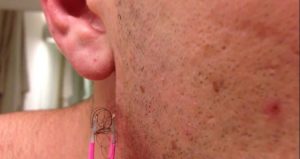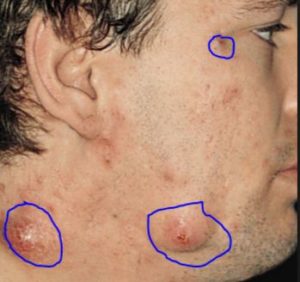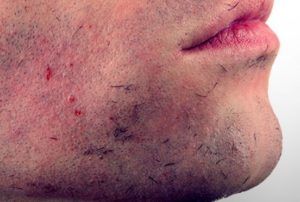Ingrown facial hair can be quite annoying. An ingrown hair is a bump or cyst that forms when hair curls back or grows sideways into the skin. Ingrown hair are common among people with coarse and curly hair. When accompanied by an infection of the hair follicles, the condition is known as folliculitis. Here are some insight on what causes the bumps. How to remove and treat an ingrown hair.
Ingrown hair on face
Ingrown facial hair can be quite annoying as mentioned. Most people will develop the bumps after shaving, which explains why the bumps are also referred to as razor bumps or pseudofolliculitis. Ingrown facial hair is not that common when it occurs, however, it causes scarring, redness, and swelling.

Unless infected, an ingrown hair does not pose any health risk. They can however, it can itchy and cause lot of embarrassment but at the end no treatment is required to get rid of them. When not infected, an ingrown hair will often go away without having to do anything. Anybody can develop ingrown hair, the bumps are however common in people who shave, those with coarse, curly hair and those with family history of Hirsutism.
Hirsutism is a condition marked by the excessive growth of thick hair in an androgen-dependent pattern where hair growth in women is usually minimal or absent. The condition occurs as a result of increased androgen production or increased skin sensitivity to androgens.
Regardless of gender, you need to be checked by a doctor, if you feel the amount of hair on the face is excess. You could be dealing with a serious condition. There are however, different ways you can manage and handle ingrown facial hair at home.
Ingrown facial hair causes
An ingrown facial hair is quite common. Common on beard area, these bumps are formed when hair strands curl back and re-enter the skin. This is common in people with curly and coarse hair. An ingrown hair can also form when the hair strands fail to protrude the skin thus growing sideways underneath the skin.

Clogged or blocked hair follicle is another common cause of ingrown hair on different parts of the body. Blocked with sebum and dead skin cells, this is what forces the hair to grow sideways. The chances of this happening increases if the hair is curled, coarse or has been recently shaved.
Ingrown hair is common on part of the body that you may shave. Apart from the face, the bumps can also appear on legs, armpit bikini area, and pubic area. Poor methods of hair removal are the main cause for the formation of ingrown hair. In this places, after shaving, the hair that grows back has sharp edges making it very easy to poke back into the skin.
Most of the time, an ingrown hair will look like a pimple with a visible strand of hair beneath the skin. Anybody can get an ingrown hair, the condition is, however, common in people with high level of certain sex hormones that causes excessive hair growth.
You should avoid cutting hair too close to the skin, adopt proper skin care methods especially on after shaving. For hair removal methods like tweezing and waxing, it is important to have it performed by a professional. Also, avoid popping or draining the bumps of ingrown facial hair as this increases your chances of having a bacterial or fungal infection on the skin. Seek medical attention for bumps that become too irritating or causes a lot of discomforts.
Ingrown facial hair bump
As mentioned, ingrown hair is common and can occur on any part of your body. On the face, the hair follicles or ingrown hair can sometimes become infected and inflamed. Bumps forming on the skin as a result of an ingrown hair can be referred to as folliculitis.
A clogged hair follicle will be filled with dead skin cells, sebum or with pus. It is quite noting that pus filled ingrown hair bump does not always mean there is an infection. Most cases of these bumps can be managed and controlled at home. Mild cases of folliculitis require no treatment, most will clear on their own within a week or two.
With ingrown hair facial bump, you need to avoid shaving, for the time being, simple home remedy like dabbing a mild antiseptic such as tea tree oil might help relieve the itching and also speed up the healing process of this kind of bumps. If after 3 days the spots fails to get better, see your health care practitioner as soon as possible.

A dermatology or skin care practitioner will be able to remove the ingrown hair causing the bump with a sterile needle. He or she may be able to prescribe the right antibiotics in cases of severe skin infection. An infected ingrown hair bump will more likely develop into painful pustules, boils or abscesses.
Deep Ingrown facial hair infection
Popping an ingrown facial hair on skin opens it up to a possible deep ingrown hair infection. This is what is commonly referred to as folliculitis. Folliculitis is the inflammation of the hair follicles. According to mayo clinic, folliculitis is a common skin condition in which the hair follicles become infected and inflamed.
The common cause of an ingrown hair infection is a bacterial or fungal infection. An infected ingrown hair bump will start as a small red bump or white headed pimple around hair follicles. If no urgent medical attention is taken, the infection can spread and turn into a non-healing, crusty sores.
Most cases of facial ingrown hair infection are not life-threatening. The bump on the face can, however, be itchy, sore and embarrassing. Folliculitis or infection of the hair follicles is common in the beard area, arms, back, buttock and legs.
Deep ingrown facial hair infection can be caused by:
- Bacterial and yeast infection
- Poor facial shaving
- Wearing clothes that irritate the follicles on skin
- Blocked hair follicles from sweat, oils or facial makeups
- As a result of an injured or damaged hair follicle
Mild cases of deep ingrown hair infection usually heal on its own. Simple remedies like a warm compress once or twice a day may help speed up the healing process. Just soak a clean face towel in warm water and place it on the affected parts of the face. When the infection is occurring in the beard area, washing with medical shampoo can be used to treat folliculitis.
Ingrown facial hair cyst
An ingrown hair cyst sometimes called trichilemmal cyst is a cyst that forms inside the hair follicle. A cyst is an abnormal closed epithelium-lined sac in the body. It contains a liquid or semi-solid substance. Most of the skin ingrown hair cyst are harmless, it is important to have them removed since some may occasionally change into malignant growths, become infected or obstruct a gland.
A facial ingrown hair cyst can be painful and cause severe irritation to the facial skin. You should not pop or drain the cyst. If an ingrown hair cyst becomes too painful or irritating, seek medical attention. Do not pull or try to pop an ingrown hair cyst. An ingrown hair bump will turn into a cyst after it is infected.
Gently wash the area with an ingrown hair with warm water and a mild soap to prevent irritating the skin and prevent skin infection. Do not pop or try to squeeze to drain an ingrown facial hair cyst.
Ingrown facial hair female
Facial ingrown hair is not common in female as it is in males. In women, however, these bumps are common on legs, pubic area, bikini area, and buttocks. This is the area female’s commonly shaved. Blocking of the hair follicle by use of strong foundation makeup and other cosmetic products is the other common cause of ingrown hair on the face.
A genetic condition that causes excessive hair growth is also a possible cause of ingrown hair in females. Tweezing and plucking out stray hair may also be a cause for ingrown hair bumps. No matter how gentle you pull out hair, it could still damage the hair follicle.
Female ingrown hair treatment
In females treating an ingrown facial hair will involve discontinuing the use of foundation makeup and other cosmetic products. Exfoliating the area twice a day by scrubbing the ingrown hair gently. This helps by removing dead skin cell from the surface of the skin.
Exfoliation can also help get rid of dirt and oils that might be trapping the ingrown hair. A warm compress is another simple home trick females may use to get rid of ingrown hair on their face. To apply a warm compress, just wet a washcloth and press it against the ingrown hair. When it cool down, run it under the hot water again, apply the cold compress twice or thrice a day.
Acne medication may also be used to get red or treat ingrown facial hair. Apply a dab of this medication on the ingrown area and gently rub in a circular motion. This medication help reduces the swelling of the hair follicle especially when an ingrown hair bump is filled with pus. Shrinking the bumps gives the hair enough room to grow out of the skin.
Ingrown facial hair treatment, cream
Most cases of ingrown facial hair do not require treatment to get rid of. Creams, gels, and pills can be used to treat Have a dermatologist look at an ingrown hair to prescribe the best way to treat it. To treat an ingrown facial hair you can apply topical ointments. This will help reduce the itching and irritation. Depend on what the extent of the infection is, oral antibiotics may be used. Apply a warm, moist compress to the affected area for a few minutes. This may help soften the skin and relieve the itching and swelling.
Acne medication as mentioned is also good for ingrown hair bumps. They help bring down swelling that might and inflammation of the hair follicle causing the ingrown hair.
Exfoliation is another way of treating an ingrown hair. exfoliation will help unclog blocked hair follicle by getting rid of dead skin cells, dirt, sebum, and bacteria that might cause infection inside the hair follicle leading to boils and abscesses on skin.
You will also need to:
- Avoid or stop removing the hair in that area
- Exfoliate the face twice or thrice a week to remove dead skin cells and dirt on skin
- Use anti-itching and anti-inflammatory creams to relieve this symptom
- In cases of bacterial or fungal infection of the hair follicles, antibiotics and antifungals medication may be used.
Ingrown facial hair removal
There are different removal tips that you can use on an ingrown facial hair. If you shave often, then the bumps are somewhat common. Here are some tips on how to remove an ingrown hair.
- Removal with a sharp pair of tweezers is the common and the easiest way to remove an ingrown hair on the face. You can also choose to use a sterile needle. When using a sharp object to remove an ingrown hair, make sure you avoid digging into the skin. This could open your skin for possible bacterial and fungal infection.
- You can also use a warm compresson the area with an infected or inflamed ingrown hair. The heat of the compress softens the skin, this helps bring the ingrown hair closer to the skin making it easy to get rid of it.
- The other simple way to remove an ingrown hair on the face is by exfoliating the skin. Exfoliating involves the removal of the old dead skin cells on the skin’s outmost surface. The process of exfoliating is involved in the process of all facials, during microdermabrasion or chemical peels at medical spas. The process of exfoliation can be done both mechanic and bb use of chemicals.
Before attempting to remove an ingrown facial hair, you need to first make sure the bump is not infected. Removing an ingrown hair increases the chances of having a skin infection or causing the inflammation of the hair follicles also known as folliculitis. One the bumps or cyst containing the ingrown hair is diagnosed, a dermatologist will be able to clearly say whether you suffer from a serious bacterial or fungal infection.
Ingrown facial hair remedies
From our discussion, we have seen that unless an ingrown hair is infected, no treatment is required. This is because facial ingrown hair is not life-threatening. Some may, however, be annoying and cause a lot of discomforts, itching, and irritation, here is how you can handle some of the symptoms of an ingrown hair using home remedies:
Tea tree oil
Tea tree is said to have antibacterial, antiseptic and anti-inflammatory properties that help heal the skin and also prevent infection. Before using tea tree oil on the skin, make sure to dilute it with some water. When applied on face, it helps relieve the skin of the irritation, the itching, and burning sensation.
Apply Aloe Vera after shaving
Aloe Vera gel is rich in anti-inflammatory, antibacterial and antiseptic qualities. After shaving your face, apply a thin layer of aloe Vera gel, leave it on for some minutes before rinsing it off with warm water and a mild soap. Repeat this to relieve the skin of the itching and irritation.
Sugar scrub to exfoliate the skin
Sugar can be used as a great skin scrub product to get rid of ingrown facial hair. when used on skin, it gently exfoliate the skin by removing dead skin cells, by so doing, it slowly helps bring the ingrown hair out of the skin. Continuous use of sugar will make the skin silky smooth.
Baking soda paste to soothe the skin after shaving
Another great skin soothing agent is baking soda paste. Baking soda also has anti-inflammatory property that can help with the itching. Baking soda also works by exfoliating the skin and reducing redness caused by ingrown facial hair.
Ingrown facial hair prevention
There are different ways you can prevent an ingrown hair from forming. For starters, the easiest way would be to stop shaving, let your facial hair grow. This is however not practical for most people. What then is the best way to prevent an ingrown hair and a possible infection of the hair follicle?
If you cannot stop shaving, then you need to do the following to prevent the formation of facial ingrown hair or those occurring in different parts of the body:
- If you have to shave, use a sharp shaving razor. A single blade is recommended. This will help prevent the damaging of the skin which could lead to folliculitis
- Avoid shaving your skin when dry, wet your skin when with warm water and always use a shaving cream.
- For beard and other facial hair, you need to shave in the direction of the hair is grown. This helps prevent irritation and damaging the hair strand that might curl and grow back into the skin.
- Avoid shaving too close to the skin.
- Use a few stroke of razor as soon as possible making sure to rinse the razor after every stroke
- You could adopt other removal technique such as waxing.
- Rub your face daily in a circular motion, you could also use an exfoliating scrub to tease out any stubborn ingrown hairs
- After shaving, apply a cold compress to your skin to reduce irritation
- You can also prevent ingrown hair by cleansing your face routinely, wash your face every day using a mild soap and lukewarm water, exfoliate your skin regularly and moisten your face daily.
Sources and references
- Ingrown hair: http://www.nhs.uk/conditions/ingrown-hairs/Pages/Introduction.aspx
- Ingrown hair causes, how does it look like: http://www.webmd.com/skin-problems-and-treatments/guide/ingrown-hair-causes-symptoms-treatment#1
- How to get rid of ingrown facial hair: http://beardoholic.com/ingrown-facial-hair/
- How to get rid of ingrown hair, symptoms, causes, treatment: https://www.folliculitisclinic.com/how-to-get-rid-of-ingrown-hairs/
- What is an ingrown hair: http://www.medicinenet.com/ingrown_hair/article.htm
- How to prevent ingrown hair: http://www.skinacea.com/how-to/treat-ingrown-hairs.html#.WK5ekzuGPIU


